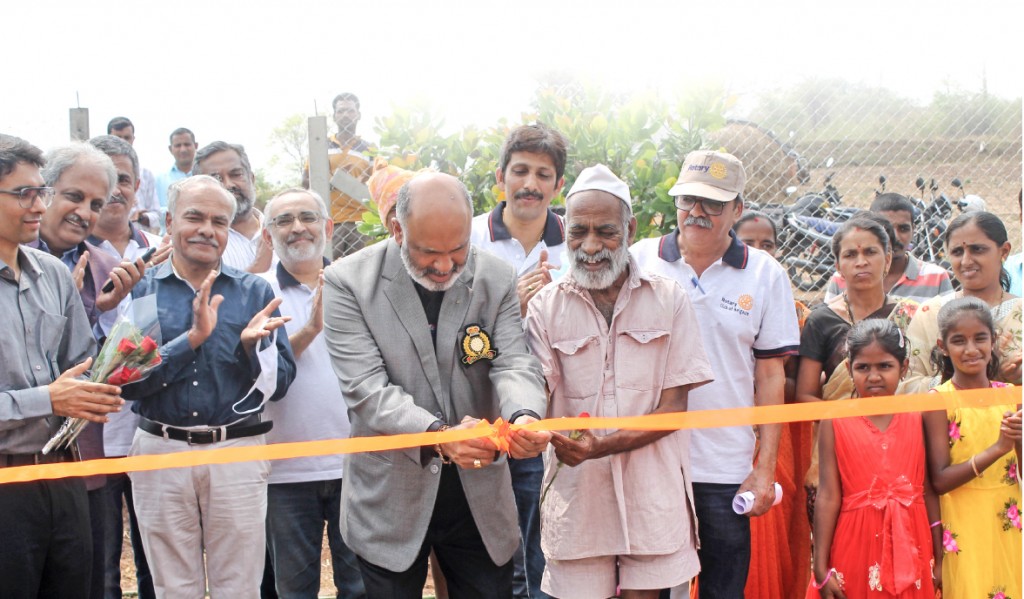Power humare haat mein hain (We have power),” says Arun Krishna, a 29-year-old-farmer from Mahalenahatti village, 15km from Belgaum in Karnataka. “We had to depend on electricity to pump water to irrigate our fields,” but after RC Belgaum, RID 3170, installed the Smart Aqua Net, a 10kWp solar-powered system for irrigation, “we can work from 7am to 6pm. Unlike the times when we had no clue when the electricity would come. Sometimes the electricity would come at midnight and we would run to our fields and work in the darkness,” he says.

Project chairman and president of RC Belgaum, Milind Patankar says that the farmers have lived here for generations. “They depend on rain for agriculture and grow one crop a year (either paddy or maize) and post-harvest, the farmers would migrate to nearby cities and work as labourers for the rest of the year, struggling to make ends meet.”
Krishna’s father who is also a farmer “never wanted me to come to the field. He sent me to college and after I got degree, I took up a job. I always wanted to do farming, researched organic farming and realised I could help my father in so many ways.” He quit his job after four years and went back home “but I was not welcome. My father said that I was getting on a sinking ship and that my life would become miserable. I wasn’t willing to change my decision and began working towards my dream.”

On a trial basis, he started growing chilly, carrots and potatoes. But irrigating the land was a huge challenge. Meanwhile, RC Belgaum was looking to start a new water and sanitation project when Patankar met Shivajirao Kagnikar, a social worker, who told him about the plight of the farmers.
The club struck a technical partnership with Sun Moksha Power, a Bengaluru-based company that develops and deploys clean and sustainable technology solutions and provides consulting services for rural development and urban sustainability. “We wanted to demonstrate a sustainable model before scaling it up for other farmers and villages,” says Patankar. Kagnikar helped the farmers understand that Rotarians “wanted nothing in return for the help being offered.” The first model was set up on 26 acres of land belonging to 14 farmers, six of them women.
Patankar points out that the smart irrigation model “recommends and delivers the right quantity of water based on the soil, atmospheric and hydrological conditions, and increases productivity for every litre of water. It promotes shared irrigation and ensures maximum utilisation of irrigation resources and equitable distribution of water to the marginal farmers.”

This automated water management is based on real-time data from the sensors and meters communicating with the cloud network. This helps to conserve and optimise water usage for irrigation, and also ensures a sustainable business model wherein farmers are billed for the water they consume. This infrastructure allows all the stakeholders to monitor the performance of the system remotely and get regular reports on individual farmer’s water consumption, billing and collection.
“The collected money is deposited into the bank account held and operated by the village water committee, Krishidhan Sahayogi Sangha, Mahalenahatti. This money will be used to maintain the system and scale the project. The farmers have also received basic troubleshooting and maintenance training.
The availability of water throughout the year means that Lakshmi’s husband doesn’t have to leave to the city to work at a hotel. “It feels like finally our prayers have been answered,” says the woman farmer who now doesn’t have to “slog and carry the load of heavy farming equipment alone.”
The project was inaugurated in the last week of March by DG Gaurish Dhond in the presence of Kagnikar, club president Patankar, secretary Laxmikant Netalkar, other members of the club, beneficiaries, and the village community.






